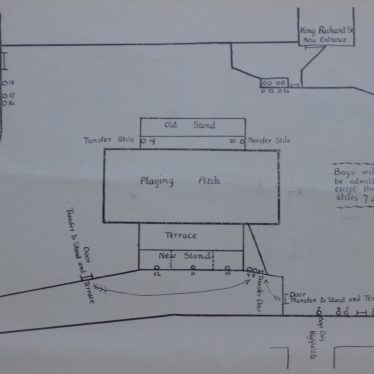Walter Kimberley’s wartime experience is one of hardship, effort, determination… and ultimately death, though not by any bullet wound. His is a story that shows war can claim casualties away from the stereotyped image we have of a battlefield.
Before the war
His life before the war saw him born in Bordesley, Birmingham in 1884, one of 11 children. His parents were Charles William Kimberley, a bone turner/general labourer, and Myra. At the age of 16 (1901) Walter was an engraver, however at the time of joining the army as a reserve in 1904 (he was noted as a private in the reserves in 1907), he was recorded as a packer.
In July 1909 Walter married Ada Steward. Their first son Walter Harold was born on December 6th 1909, but unfortunately died a year later in December 1910. A second son Charles William was born July 26th 1911.
Walter had played for both Aston Villa and Walsall before joining Coventry City in 1912. Club historian Jim Brown states how Kimberley made 23 appearances for Coventry before war was declared, scoring one goal. During Kimberley’s time with the club, he also worked for Coventry Ordnance Works.
The outbreak of war
At the outbreak of the First World War, in August 1914, Walter was mobilized at London and posted to the 1st Battalion of the Coldstream Guards, and a few days later he was appointed Lance Corporal. It was not long, however, before he was taken prisoner, this happening the very next month on 9th September 1914.
We are fortunate that Walter’s experiences as a Prisoner of War have survived, and are available to view at the National Archives. They are also available on find my past.1 The start of his account gives his details.
- Name, Rank, No. and Regiment: Walter Kimberley, No.5465, Coldstream Guards
- Home address: 2 Court, Seven House, Castle Street, Coventry
- Nature of Wound, if any: Unwounded- Tuberculosis
The following page recounts his experiences.
1 War Office Unregistered Papers First World War; Committee on the Treatment of British Prisoners of War – Interviews and Reports. The National Archives reference WO 161/98/634. “The reports were made by the Committee on the Treatment of British Prisoners of War before the Armistice was signed on 11 November 1918. The Committee appointed examiners who conducted interviews with repatriated, escaped or interned prisoners of war to ask about how they had been treated. The examiners then wrote up the reports.” These reports have only recently been released on find my past.










Comments
Add a comment about this page